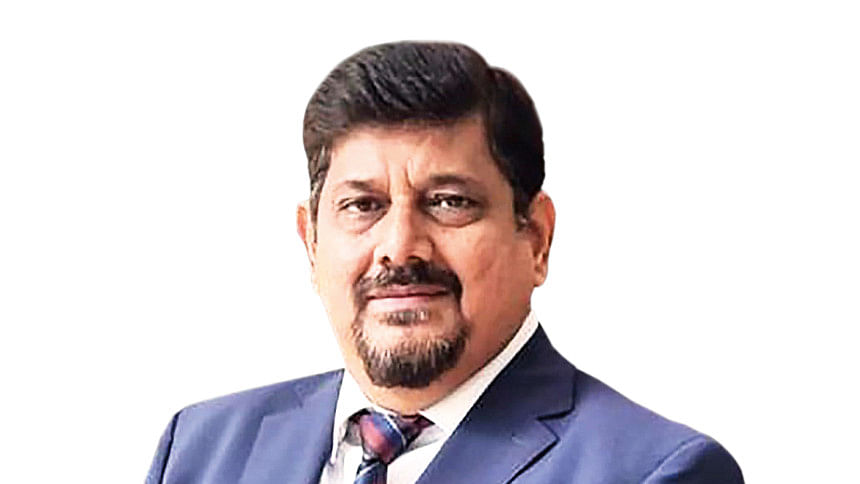Supporting MSME Growth in a Shariah-Compliant Manner

Mohd. Rafat Ullah Khan
Managing Director (CC), Al-Arafah Islami Bank
The Daily Star (TDS): How do you assess the current state of the MSME sector in Bangladesh? What role do you think banks can play in accelerating its growth?
Mohd. Rafat Ullah Khan (MRUK): Bangladesh's CMSME sector (Cottage, Micro, Small, and Medium Enterprises) is a powerful driver of industrial growth, rural employment, women's economic participation, and poverty reduction. With approximately 11.8 million active enterprises, CMSMEs contribute over a quarter of national GDP and engage millions of workers, including large segments of women and youth.
For the banking sector, CMSMEs represent both a developmental imperative and a strategic opportunity. As the sector continues to expand, banks play a pivotal role in bridging the financial inclusion gap by offering customised, Shariah-compliant, and sustainable financial solutions tailored to the unique needs of small entrepreneurs. Beyond financing, CMSMEs open new avenues for digital banking, agent networks, and partnerships that can deepen outreach and strengthen community-level resilience.
TDS: What are the major challenges MSMEs face in accessing finance, and how is your bank addressing these issues, especially for micro and cottage industries?
MRUK: Major challenges faced by MSMEs in Bangladesh—particularly micro and cottage industries—include lack of adequate collateral, relevant business experience, sustainable revenue generation capacity, audited financial statements, sponsor equity injection, and expansion capability. Additionally, many MSMEs operate in informal sectors, making it difficult for banks to assess risk accurately.
At Al-Arafah Islami Bank PLC, we recognise these challenges and have tailored our approach to bridge the financing gap. We offer Shariah-compliant, collateral-free investment products specifically designed for micro and cottage industries, focusing on cash-flow-based rather than traditional asset-backed financing.
TDS: Does your bank have any dedicated products, financial literacy programmes, or credit guarantee schemes targeted at MSMEs?
MRUK: Al-Arafah Islami Bank PLC is committed to supporting the growth and development of MSMEs through a range of Shariah-compliant financing products, capacity-building initiatives, and strategic partnerships.
Dedicated MSME Products:
Our bank offers a suite of investment products tailored to meet the diverse needs of MSMEs:
• Micro Enterprise Investment Scheme: Provides financial support to micro-enterprises, facilitating their growth and sustainability.
• EME Investment Scheme: Assists small and medium enterprises in expanding their operations and enhancing productivity.
• Women Entrepreneurs Investment Scheme: Empowers women entrepreneurs by providing the necessary financial resources to establish and grow their businesses.
• Start-up Uddog Scheme: Our "Uddog" scheme under the Al-Arafah Rural Development Program (ARDP) is a best-in-class model for rural financial outreach—going beyond loans to build economic resilience, financial discipline, and social equity in Bangladesh's rural heartland.
These products are structured using Shariah-compliant modes such as Murabaha, Mudaraba, Musharaka, and HPSM, ensuring ethical and transparent financial transactions.
Financial Literacy Programmes:
Our Financial Inclusion Department conducts workshops and seminars to enhance MSME financial literacy and promote digital banking in local communities.
Credit Guarantee Schemes:
To mitigate the risks associated with lending to MSMEs, our bank has partnered with Bangladesh Bank to access credit guarantee facilities. This collaboration enables us to offer refinancing facilities and risk mitigation support.
TDS: How has your bank leveraged technology or digital banking solutions to improve outreach and services to MSMEs, particularly in semi-urban and rural areas?
MRUK: While our bank has taken a cautious and Shariah-compliant approach to digital banking adoption, we are gradually integrating technology to enhance customer service and operational efficiency in ways that align with Islamic financial principles. Our core banking systems have been upgraded to enable faster transaction processing, centralised customer data management, and improved service delivery across branches.
We offer SMS banking and mobile alerts, while expanding agent banking, digital onboarding, and mobile services to reach underserved MSMEs.
TDS: What steps is your institution taking to support women-led MSMEs and promote financial inclusion among underrepresented segments?
MRUK: To ensure focused service delivery, each of our branches hosts a Women Entrepreneurs Desk, offering tailored guidance on Shariah-based financing. In collaboration with Bangladesh Bank, we also offer a refinance scheme that provides affordable investment at a concessionary profit rate, encouraging women entrepreneurs to formalise and grow their businesses.
TDS: Looking ahead, what policy reforms or collaborative efforts between banks and the government would you recommend to ensure sustainable development of Bangladesh's MSME ecosystem?
MRUK: To ensure the long-term, sustainable growth of Bangladesh's MSME sector, a coordinated approach between the banking sector and the government is essential.
Key recommendations include:
• Strengthening the Credit Guarantee Scheme (CGS): A more robust and well-funded CGS—covering a wider range of MSMEs, especially cottage and women-led enterprises—would encourage banks to lend confidently without being overly reliant on traditional collateral.
• Simplifying regulatory compliance: Many MSMEs struggle with complex licensing, tax, and reporting requirements. Streamlining these through one-stop digital service portals can significantly reduce the burden on small businesses and bring more of them into the formal financial system.
• Promoting Shariah-compliant refinancing facilities: Expanding refinancing schemes through Bangladesh Bank, specifically tailored for Islamic financial institutions, can improve liquidity and support ethical financing solutions for underserved entrepreneurs.
• Enhancing financial literacy and entrepreneurship training: A national-level partnership between banks, the SME Foundation, and educational institutions can scale up technical and financial literacy programmes, preparing MSME owners to manage risks, digitise operations, and scale sustainably.
At Al-Arafah Islami Bank, we believe that policy reforms must be inclusive, forward-looking, and aligned with both national development goals and the principles of Shariah.

 For all latest news, follow The Daily Star's Google News channel.
For all latest news, follow The Daily Star's Google News channel. 



Comments